
The concept of combining a cordless vacuum with a mop is not new. However, these appliances are usually an electric mop that can also sometimes pick up small debris while washing your floors. The Dyson V15s Detect Submarine is so much more.
The V15s Detect Submarine is Dyson’s first Wet & Dry cordless vacuum. It offers everything you’d expect from the standard Dyson V15 Detect but with the addition of a new wet roller head.
The original Dyson V15 Detect has been among the best cordless vacuums for some time. I was excited to get my hands on this revamped wet and dry model to see if the addition of a wet cleaning floorhead will revolutionize the way we clean our floors.
Product specifications
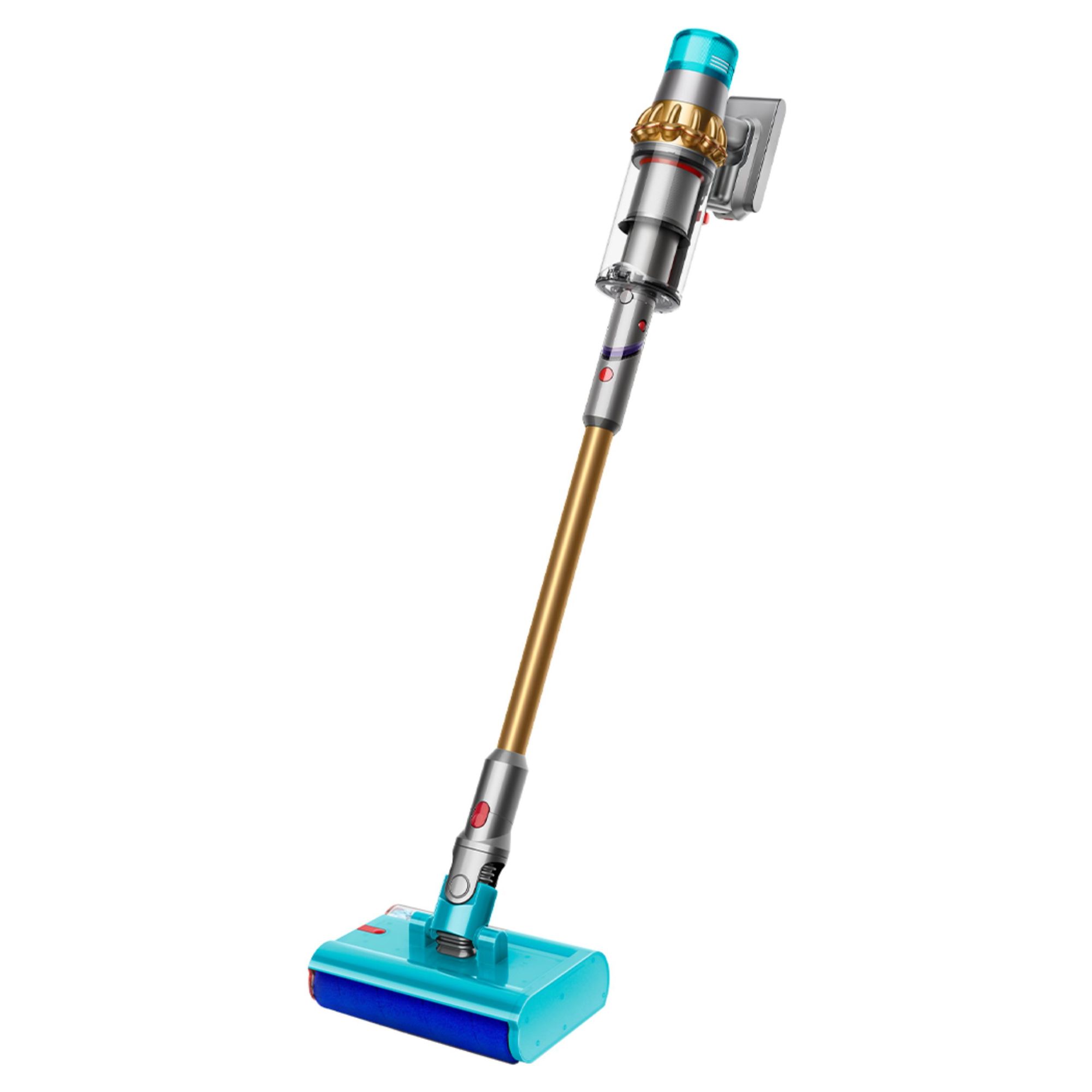
Who does it suit?
Anyone looking for an all-in-one floor cleaning solution that can still offer excellent vacuum performance in addition to washing floors.
It’s best suited to those with plenty of storage space, because you’ll need somewhere to store the three floorheads, plus the three smaller handheld tools.
The wet cleaning function is ideal for homes with lots of hard floors, especially very flat hard floors like LVT or wood. But it might struggle in very busy, messy households, since it works best for lighter wet cleans and doesn’t clean all the way to the edges of the room.
Unboxing and setting up
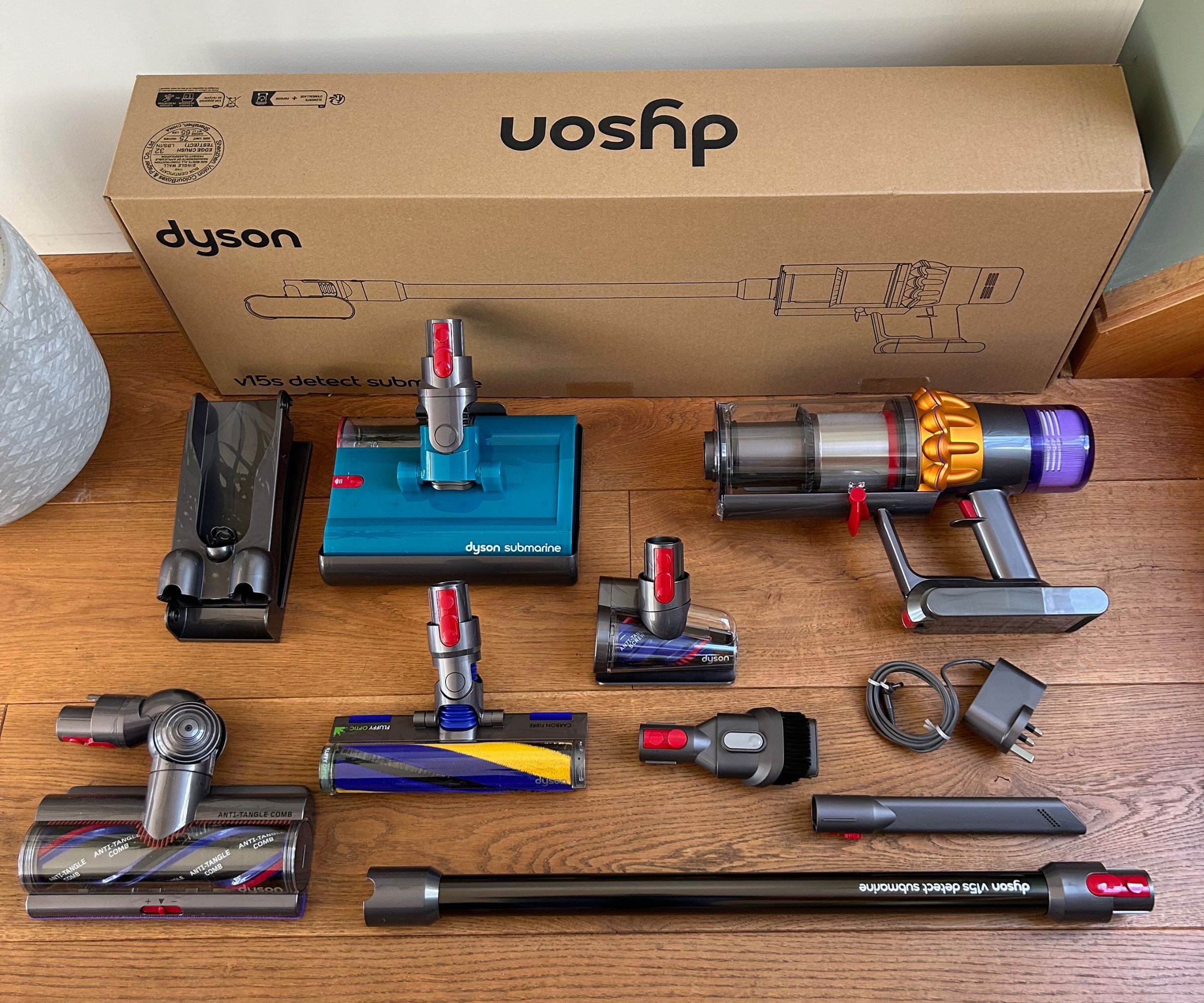
I generally find that Dyson packaging is plastic-free and easily recyclable. Every part of the packaging was either paper or cardboard, so full marks on that front.
There’s no assembly or setting up, unless you’re attaching the 'wall dok' – Dyson's spelling, not mine – to the wall, in which case there’s some minor DIY to tackle. The only thing I had to do was plug the charger cable into the battery and familiarize myself with all the attachments and accessories.
The V15s Detect Submarine comes with three floor tools. There’s the Fluffy Optic cleaner head with a laser to illuminate microscopic dust on hard floors. The Digital Motorbar cleaner head is the one you’ll need for carpet, but it can move between hard floor and carpet.
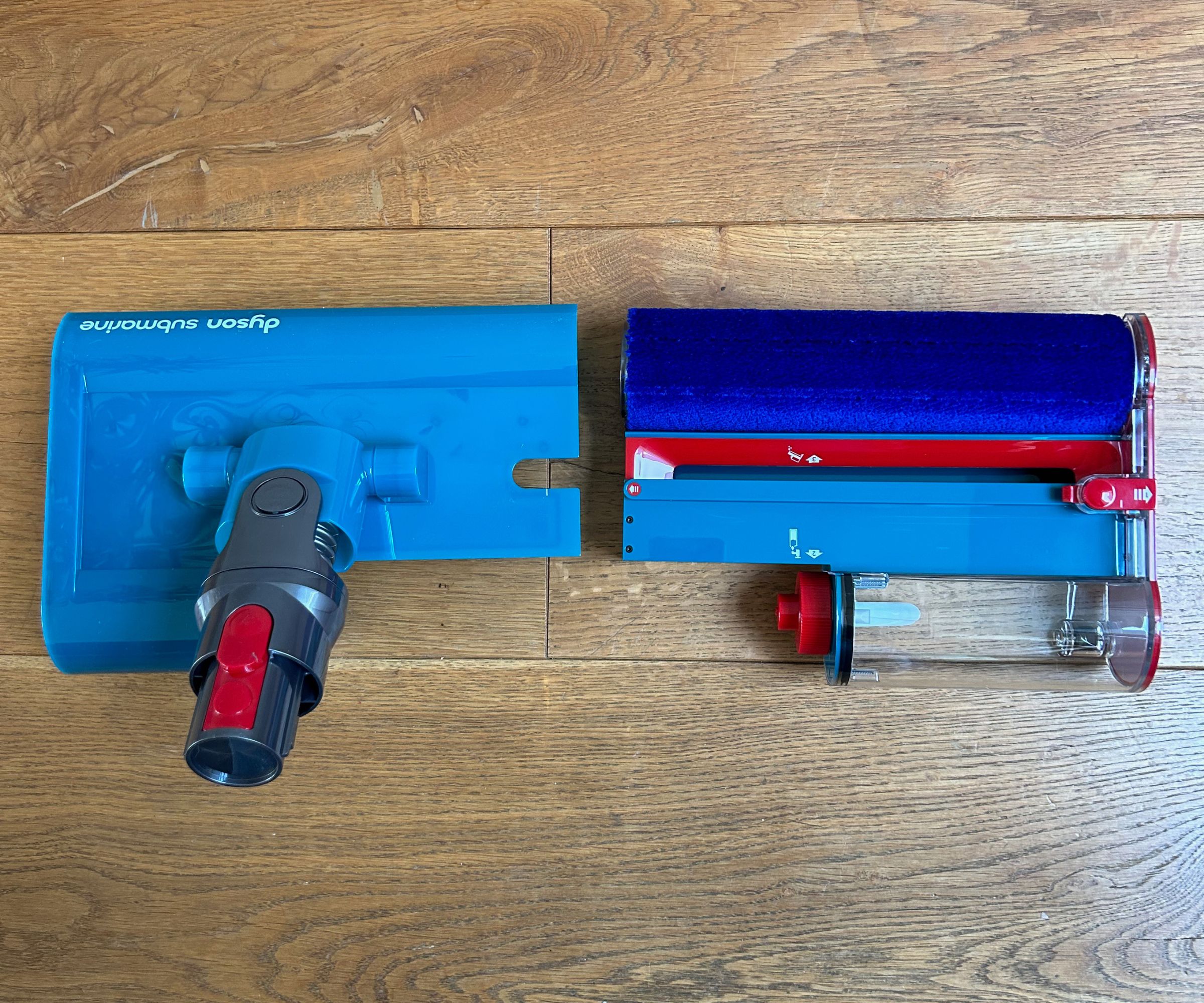
Lastly, but most importantly for this particular model, the Submarine wet roller head for wet cleaning on hard floors. The wet roller head is cleverly designed to house the microfiber roller head as well as both the clean water tank and the dirty water tank, so no water makes its way up the wand to the main part of the vacuum. All wet cleaning elements are contained within the floorhead.
For cleaning above floor level, the hair screw tool is perfect for pet beds and upholstery. The combination tool can tackle most other jobs and the crevice nozzle can reach into any awkward spots.
The controls are pretty self explanatory. As with all cordless Dysons before the Gen5Detect, the trigger on the handle has to be held down for power. The color LCD screen feeds back real time data on the particles removed, as well as battery percentage. The button on the screen allows you to cycle between the power levels: eco, auto, and boost.
Test 1: Wet cleaning
I couldn’t find any information about whether to use hot or cold water when filling the water tank, so I opted for cold to be on the safe side. It is plastic, so I didn’t want to risk damaging it by adding too-hot water.
You can add detergent into the water tank, as long as you pay attention to recommended dilution levels. However, I wanted to see how well it performed without the aid of any detergent.
Once switched on, the vacuum instantly recognised that the wet roller head was installed and displayed a water droplet symbol on the screen. Then, it took around 30 seconds for water to make its way through and start wetting the floor.

Due to the design of the flat roller, it didn’t manage to thoroughly clean my rustic, uneven slate kitchen floor. This didn’t surprise me, as it is a particularly uneven floor and no other electric floor washers I’ve reviewed have managed to reach into the deep undulations either. That said, it did cover about 90% of the floor.
There were a few spills on the slate tiles, including a small dusting of rice flour and some dried on coffee drips. Both of these were swiftly removed. Although the flour in the grout lines remained. It can’t clean into deeper grout lines and I noticed this when cleaning the tiled floor in my bathroom too.
On my engineered wood floor in the dining room, it cleaned the wood without leaving it too wet. I noticed the water in the tank was all gone after 17 minutes. And subsequently read on the Dyson website that the tank provides enough water for about 16 minutes of mopping.
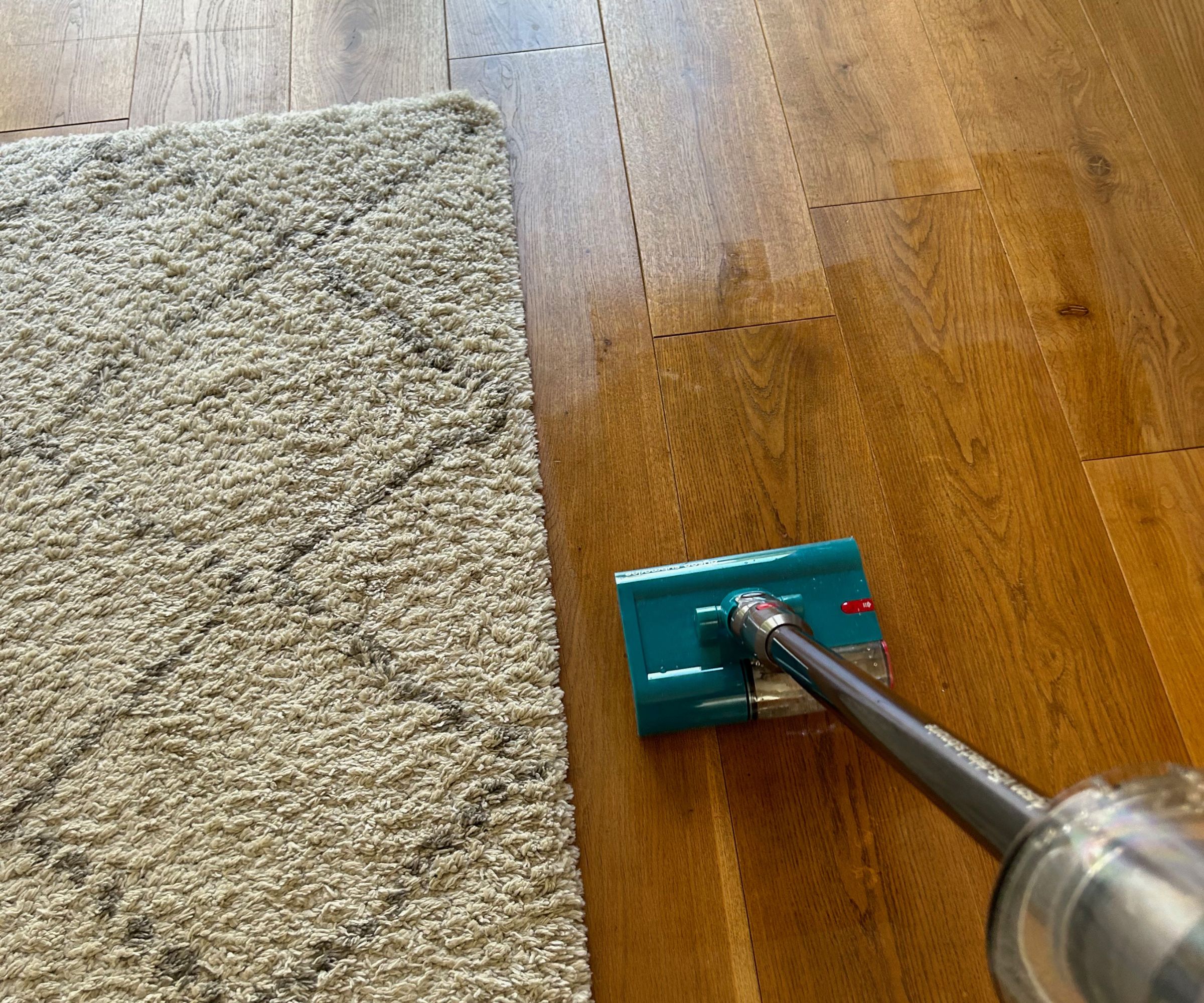
Given how much data the screen gives about the size of dust particles while vacuuming, I’d been expecting an alert or something on the screen to tell me when it was time to refill the water tank. But surprisingly there wasn’t one, instead, you have to keep an eye on the clear water tank and fill it up when you notice that it has run out.
On first impressions, the water tank looks tiny and there’s barely any space for dirty water. But despite the size, it lasted long enough for me to tackle my kitchen and dining room floors in one pass. Then on another occasion, there was enough capacity to clean two small bathrooms, as well as my living room floor.
It’s good to know that wet cleaning doesn’t drain the battery very fast. After 20 minutes of mopping, there was still 80% left on the battery, so there’s plenty of time to get round several rooms before it runs out of juice. It's very impressive by Dyson standards – older generations of Dyson cordless vacuums could only last 20 minutes in total.
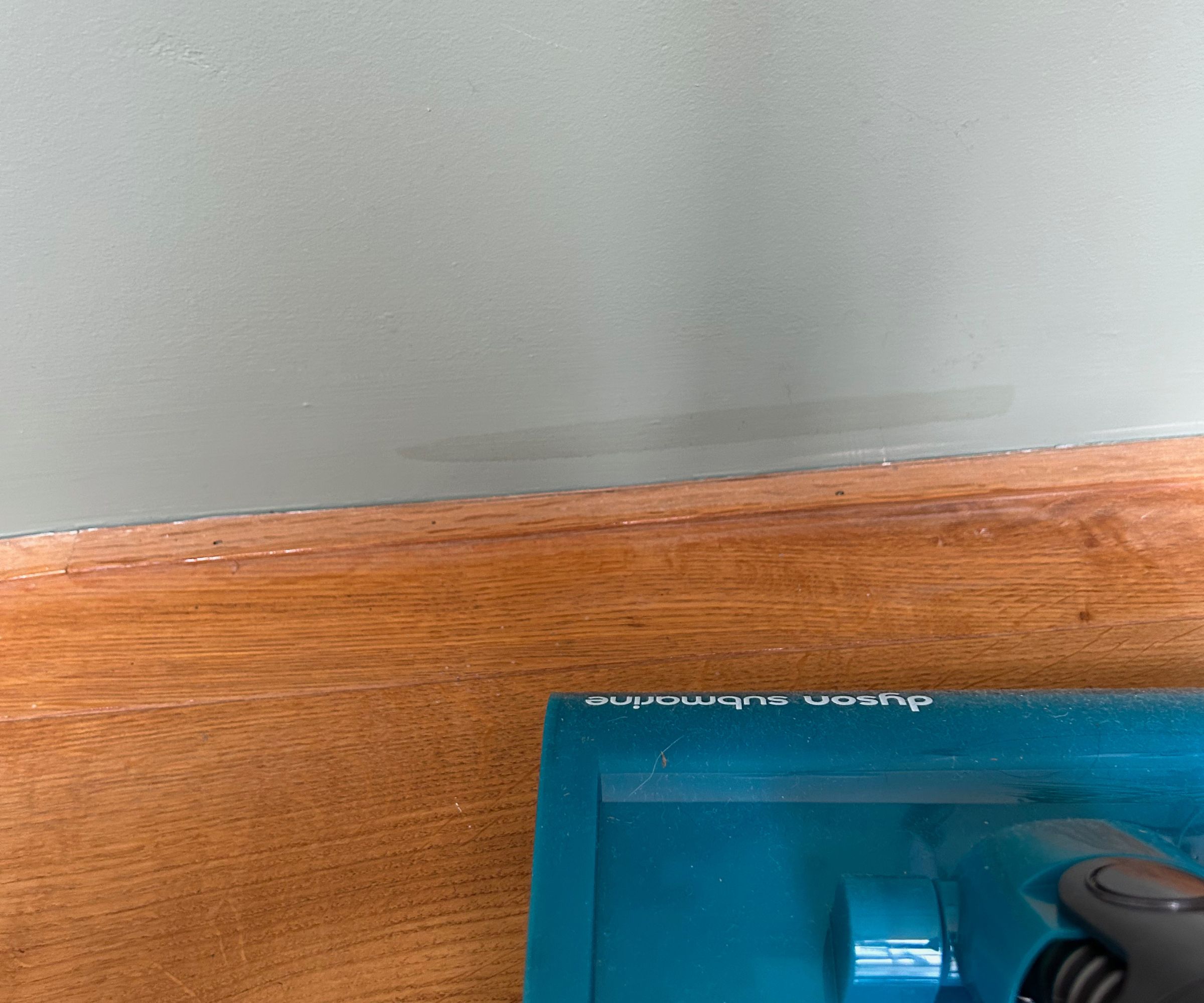
On the whole, my floors were noticeably cleaner, and I didn't even use detergent. However, I’d say it’s at its best on flat surfaces such as LVT floors, wood floors, and vinyl or linoleum. It will work on tiled floors, but you’ll have to scrub the grout separately once in a while.
What's more, I found that it doesn’t clean all the way up to the baseboard. I noticed a thin dry line along the edge of the floor. It leaves just under half an inch all the way around the edge of the room that doesn’t get mopped.
My biggest criticism is that if you approach baseboards with the front edge of the floorhead, the exposed wet roller touches the baseboard. it can leave a dirty smear on the baseboard that you have to come back to with a cloth to clean off by hand. This was particularly stressful for me, as some of my walls don’t have baseboards, so it was leaving a muddy wet mark on the wall paintwork, which is far from ideal.
Test 2: Dry cleaning
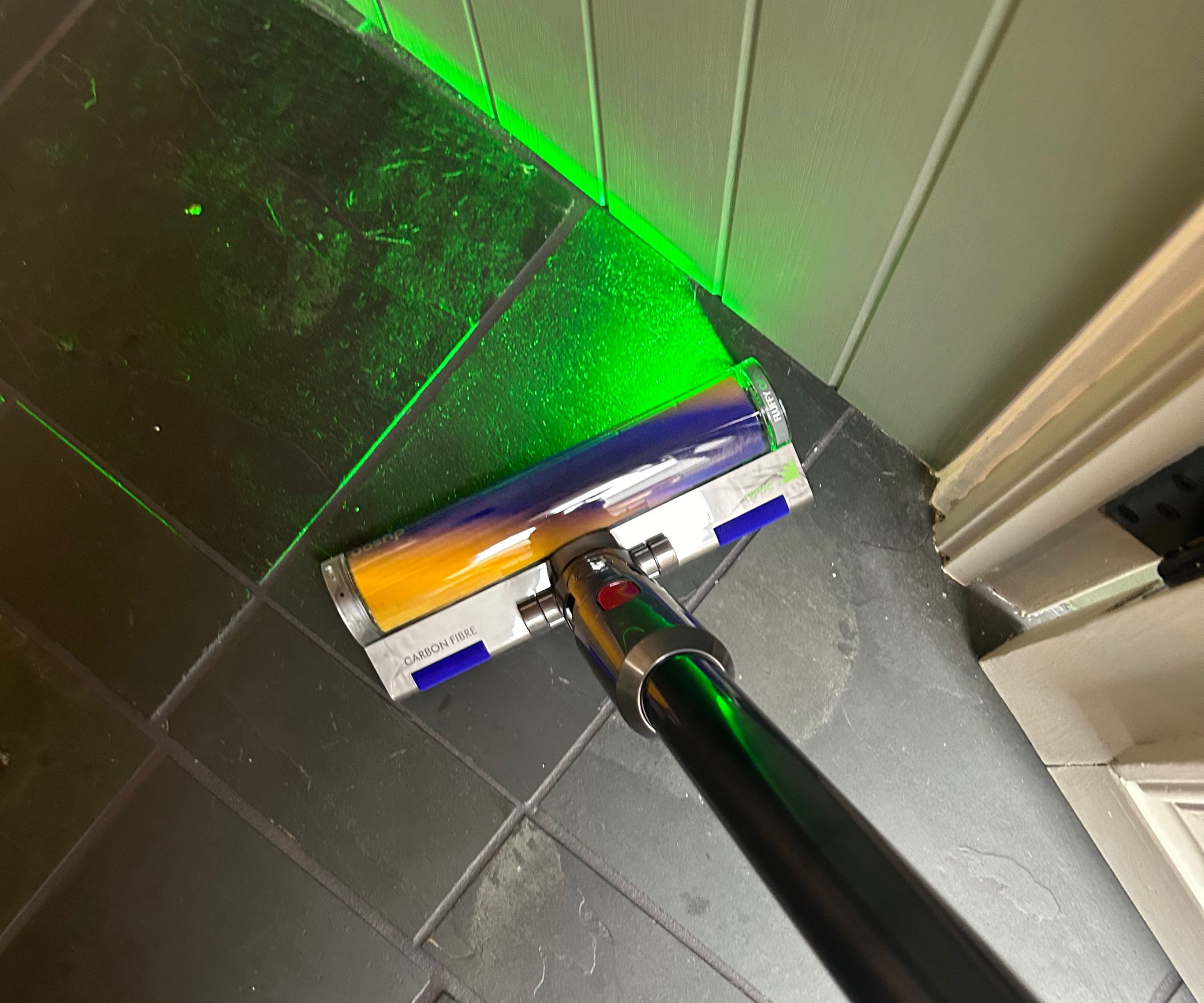
As I’ve previously mentioned, we have a separate review that covers the Dyson V15 Detect and you can find further details there about its vacuuming modes. However, I also tried out the dry vacuuming on all my floors.
This is a powerful and capable vacuum that delivers a thorough clean on both carpet and hard floors. The 'Fluffy Optic' cleaner head is particularly effective at highlighting dust that can’t be seen with the naked eye on hard floors, though it works best in dim light.
The Digital Motorbar cleaner head was able to remove dust from deep down within the fibers of my carpets and rugs. I tended to use the auto mode, which detects dirt and increases vacuuming power as needed. It’s a good compromise between providing a thorough clean without draining the battery as fast as boost mode.
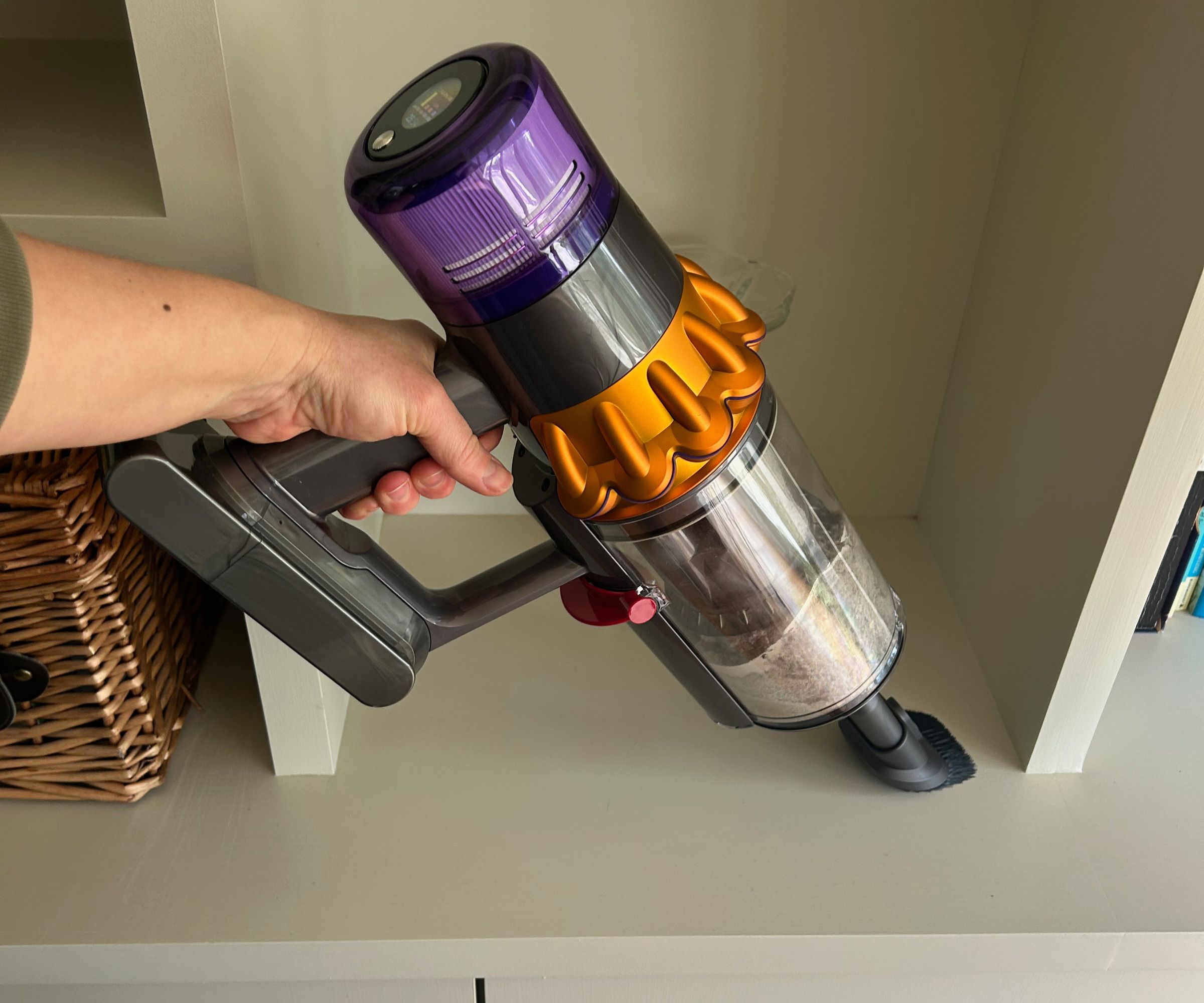
For me, there’s just the right selection of handheld tools. The hair screw tool made short work of cleaning my sofas, while the combination tool was great for collecting dust and cobwebs. In handheld mode, however, it feels bulky in confined spaces and heavy too, so you won’t want to use it like this for long periods.
That being said, as cordless vacuums go, it’s one of the best I’ve reviewed. It's only outperformed by the newly launched Dyson Gen5detect.
Cleaning and maintenance

Because all the dirty water is contained in a small section of the floorhead, there’s nothing cumbersome to clean. You can simply pop the floorhead in its accompanying tray, so that nothing spills out when you’re on your way to the sink.
You just slide out the dirty water compartment, and then you can remove the roller. There were clumps of hair and some other debris like a small leaf, but I found that a quick rinse under the faucet was enough to clean everything, including the dirty water tank and the roller housing.
However, you should keep in mind that you can’t put the wet roller head back together and store it away until it is all dry, or it may start to smell.
The rest of the vacuum is similarly simple. the point-and-shoot style dirt emptying mechanism works well to shoot dry dust and dander into the trash, and the filters are washable.
How does it compare?
In terms of a high performance cordless vacuum that can also wet clean, the Dyson V15s Detect Submarine is probably the best around. However, the $900 price tag is very steep. For a cheaper option that we also loved, check out Bissell's CrossWave Hyrdosteam, which offers wet and dry cleaning on every surface. It's bulkier than the Dyson V15s Detect Submarine, and it's corded, but it's also at least $500 cheaper, depending on sales.
If you’ve decided the wet cleaning function won’t meet your needs, the Dyson V15 Detect is still a great cordless vacuum, but it’s supplied without the Submarine floorhead.
Alternatively, those with larger budgets should look at my personal favorite the Dyson Gen5detect. This is Dyson’s newest top-of-the-range cordless vacuum, featuring all the brand's latest and greatest tech. But you’ll need a separate mop and bucket.
Should you buy the Dyson V15s Detect Submarine?
As per our review of the Dyson V15 Detect the vacuuming functionality is top notch, so really, you just need to decide whether paying a bit extra for the new wet cleaning floor head is worthwhile for you and your home.
The wet cleaning head is great for regular cleaning of floors that aren’t heavily soiled. But if you live in a country farmhouse where muddy pets and children run in and out all day, it’s probably not going to cut it for the needs of your home.
That said, for many households the wet cleaning floorhead will serve as a useful addition to an already-good floor cleaning appliance. And it’ll make regular floor washing quick and painless.
How we test
Helen tried out the new Dyson V15s Detect Submarine in her own home on a combination of wood floors, LVT floors, slate tiles and stone tiles. Though she used all the dry vacuuming accessories, she concentrated the review on the new wet cleaning floorhead.
We test vacuums and wet floor cleaners on a range of different surfaces, and test them on a huge range of different debris. We test on flour and sugar to test fine dust, cereal for larger crumbs, and hair extensions to see how a vacuum handles hair and pet fur.







